Kategorie: ‘Luxembourg’
Research Internship at DuPont de Nemours in Luxembourg
- Chemistry M.Sc.
- Luxembourg, Contern
- DuPont de Nemours Luxembourg
- 10/2023 – 02/2024
Application/Finding an internship
The Chemistry M.Sc. program at RWTH Aachen University requires three research internships, which can be completed externally, providing students with the opportunity of valuable work and life experience. While students can do an external internship in a specific research group, it is also possible to apply for an external industrial research internship. That is why I thought an internship at DuPont de Nemours in Luxembourg would provide me with valuable insights into the chemical industry, which is a potential career path for me as a chemist. DuPont de Nemours is one of the biggest chemical groups in Luxembourg and worldwide.
I took the initiative to organize my stay in Luxembourg and apply for this internship independently, without any recommendation from a professor or advertisement from the University. In October 2022, I reached out to one of the leading scientists at the company via email and after several months of communication, I was invited to an interview. Finally, in August 2023, I received the confirmation that I had secured the internship. This allowed me to have enough time to plan everything in advance before the start date. Based on my experience, I highly recommend planning an external industrial internship 9-12 months in advance.
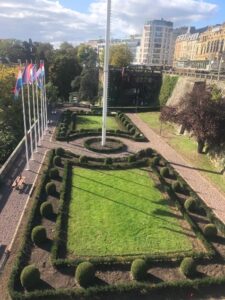
© Leon Maßem
Accommodation & Living expenses
My job was in Contern, a commune in the south of Luxembourg, east of the capital, Luxembourg City (usually referred to as the ‘city’). Finding an apartment close to the city for a reasonable price is almost impossible, as the price per square meter is close to 50€, making it impossible to finance with the Erasmus grant. I was happy to find and live in a small flat in the border area in the north-east of Luxembourg. The rent is lower and the opportunity to go shopping in Germany is very valuable. It is a fact that the cost of living in Luxembourg is 1.5 or even 2 times higher than in Germany for many products. Therefore, it is not surprising that many Luxembourgers prefer to go shopping in France or Germany. However, it is important to note that petrol, coffee, bread or tobacco are exceptions and this leads to fuel tourism in the border regions of Luxembourg. Wasserbillig is a city located on the border with Germany. It has 11 petrol stations, which I found quite amusing. Overall, I was not able to compensate all the cost with the Erasmus Grant and I had to use some of the salary that I got from work. Since the living expenses are that high, everyone should keep that in mind when planning on going to Luxembourg.
Getting around in Luxembourg is incredibly easy thanks to the country’s excellent public transport network, which is completely free.
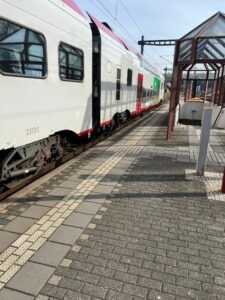
© Leon Maßem
Luxembourg is a relatively small country and the government invests heavily in its public transport system, making it possible to cross the entire country in just one hour or reach the city from the far east in just 30 minutes. This commitment was implemented to reduce car traffic which is a big problem when going towards the city. It’s no wonder that many cross-border commuters choose to rely on public transport when driving to work in Luxembourg. That is why I always chose to take the free train to work and I can recommend everyone to do so as well.
Everyday life/the internship
My contract was for a 40-hour week with 11 days of holiday over 20 weeks. I was pleased with the number of vacation days, especially since former interns at the company had reported receiving none.
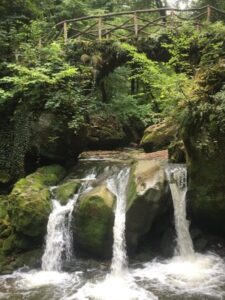
© Leon Maßem
I woke up at 6:00 am each day and left my home at 6:30 am by car. I took the option of travelling to Wasserbillig, which only took 10 minutes, and from there, I could take either the fast RE train (20 minutes to Contern) or the RB train (34 minutes to Contern). Trains arrive alternately every 15 minutes, resulting in a frequency of 4 trains per hour. I got on the train at 6.54am and arrived at Contern station at 7.18am. CFL’s service is highly reliable, better than DB’s and the train was almost always on time. Although, it is worth noting that some RE trains crossing Germany may cause delays. The company is located just a 5-minute walk from the stop.
I was given an electronic key card to enter the site and they are very strict about security. I worked in one of the R&D labs and had my own workstation with a laptop and all the equipment I needed. One of the main advantages was that, although I had to work 40 hours a week, I was able to set my own hours. As I arrived at 7.25am, I was able to leave at 3.55pm, which I loved. The team was very multicultural, from Belgian, Dutch, Greek, French to Irish. The main language of communication was English, which I got quite used to and learnt a lot. Additionally, I was able to improve my French by conversing with native speakers. I really enjoyed the interaction with so many different cultural influences, the openness and diversity. In general, no one looked down on anyone, even with PhD titles, and the atmosphere was productive and it felt like a good collaboration.
The lab itself was top class in terms of equipment and they had very good and many GCs, LC-MS, GC-MS, IR, DSC and much more that you would not expect to find in many research groups in Aachen. Although I cannot talk about my work itself, I can say that you work very independently and they give you space and time to work on your own. I had regular meetings not only with my local colleagues but also with colleagues from the US. I felt very valued and involved in their day-to-day work with my own project. However, you really feel the pressure to produce results as they expect you to present what you have done and thought about in these weekly meetings. I was able to improve my laboratory techniques, enhance my research and collaboration skills, and participate in productive meetings with common problem-solving issues.
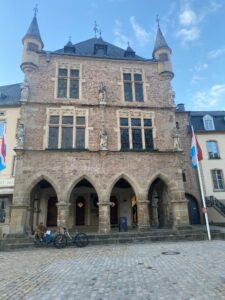
© Leon Maßem
It is definitely difficult to work at university, but I recommend everyone to experience it, as this is what most students will be working on in their future anyway.
Free time/tips
You work a 40-hour week and the work was more demanding than at university. I started in October and left in February, which meant that the sun was almost down when I got home, which made it difficult to do much outside activity during the week. I usually went out on Saturdays and Sundays, although apart from the city itself I found Luxembourg a lot quieter than Germany. However, Luxembourg has really beautiful nature and I would recommend at least visiting the very famous Müllerthal in the east with the Schiessentümpel waterfall if you like hiking. I would also recommend a visit to Vianden Castle in the north-east, which was not far from where I lived. The castle was renovated in 1977 when it was taken over by the state and is very beautiful. You can visit the castle from 10:00 to 17:00 and students only pay 5€. There is also a medieval festival which is very famous but unfortunately only in the summer so I cannot tell you about it.
The oldest city in Luxembourg is Echternach and it is indeed very romantic and has beautiful historic buildings. I also enjoyed the nearby Echternach Lake, where you can go swimming in the summer. There are many different walking routes around the lake and they have tried to place many activities around these routes such as skill runs or giant trampolines. The city of Trier (Germany) is only about 30 minutes east of Luxembourg and is worth a trip if you like Roman buildings. If you are visiting Luxembourg, you must visit the city as this is where the main activities and shopping centre are. It only took me 30 minutes from Wasserbillig, the city is worth a full day trip. The city is divided into the lower and the upper part a
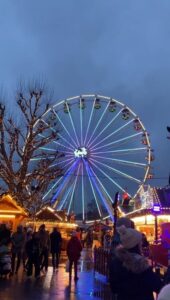
© Leon Maßem
nd I would recommend to start with the lower part and work your way up (you have to walk a lot of stairs though). The upper part has a lot of shops, but as the cost of living is so high, the prices are absurdly high. Be sure to visit the Grand Ducal Palace, as Luxembourg is still a hereditary monarchy and this is the city residence of the Grand Ducal family. A little further out is the Kirchberg area, which is the city’s banking and financial district. Luxembourg City is one of the three seats of the European Union. You can visit the European Court of Justice, the European Court of Auditors and the European Investment Bank. It is in direct contrast to the older city centre, but I still enjoyed it.
I joined a local football club that works with Germans and we met weekly. I would recommend asking around in your area as this helped me to get in touch with the locals and I enjoyed every time we met. Many even smaller villages in Luxembourg offer free sports facilities, so make sure you find out about them. I also went to the Christmas market in the city. When you enter from the train station, you make your way to the Place d’Armes, where most of the market takes place. It is interesting that they have rides like a giant wheel but again everything is very expensive and crowded. I enjoyed it but to be honest I prefer the Christmas market in Aachen.
Conclusion
Looking back, I am incredibly grateful that I had the opportunity to do a research internship within a company in such a wonderful country during my studies. I am happy that I am growing as a person and that I have made wonderful memories in Luxembourg in so many beautiful places all over the country. Although the country is small compared to its neighbours, it offers a diverse cultural density and beautiful nature. I believe that going to another country all by myself and working independently on my own project has helped me develop and is useful for my future. A disadvantage was definitely the high cost of living in Luxembourg, which limited some activities I wanted to do. However, I would highly recommend Luxembourg to anyone and will definitely visit the country again.

